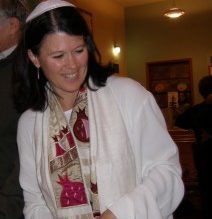Once again, all over again, we are beginning at the beginning of the Torah this week. Bereshit bara Elokim et hashamayim v’et ha’aretz, “In the beginning G-d created heaven and earth”, at least according to one translation. Haven’t we done this already? Do we really have to go back and consider the beginning again, and again?
In Jewish life, one repeats the same prayers daily; yet something new must be, somehow, brought to every utterance. Keva (routine) teaches that everything done, worth doing, demands doing again; kavanah (intention) indicates that every conviction must, sooner or later, be revisited and refreshed. This is the ancient priestly work of keeping the ner tamid, the “regularly kindled light” constantly fed, and as the wisdom of Hasidism points out, it is our task as well, in our daily re-dedication to the work of tzedek(justice) and g’milut hasadim (loving kindness). The fire upon the altar of our hearts must be regularly nourished.
To work for human rights in our day is to know the exquisite agony of starting all over again and again, of continuing to feed a tiny, vulnerable flame of hope, of wondering when – or even whether – one’s devotion will ever show a measure of illumination.
There are days when we feel powerful and in touch with the world, and other days when nothing seems to work and we are bereft. Jewish mysticism recognizes that human experience is frustrating even when we set out with the best of intentions, determined to do something good in the world and realize our own personal potential. This idea is expressed in mystical terms by the Baal Shem Tov, founder of Hasidism:
What is katnut [“lesser spiritual capacity”] and what is gadlut[“greater spiritual capacity”]? The former refers to when one sits to study Torah without preparing; in katnut, the mind is not whole. But when one learns with preparation and exhilaration, then one achieves the level of gadlut…It is just the same with prayer and with every mitzvah which a person does – one does everything in a state of katnut or gadlut.
These are the two states of consciousness possible in a human being: expanded, and then diminished, enlightened, and then bumping into things in the dark. We hope for the former, and constantly fall from it into the latter. All that saves us, according to the Koznitzer Rebbe in his work Avodat Yisrael, is that in our days of darkness, we remember that we have seen and known light.
That light will certainly return again to shine on our efforts. In that spirit, in this new year of 5773, again we begin with Bereshit, again we rededicate ourselves to the illumination we bring through tzedek, justice, and g’milut hasadim, loving kindness. As we share light and warmth and passion, may it feed us, and may we feed each other.
Ken yehi ratzon.

